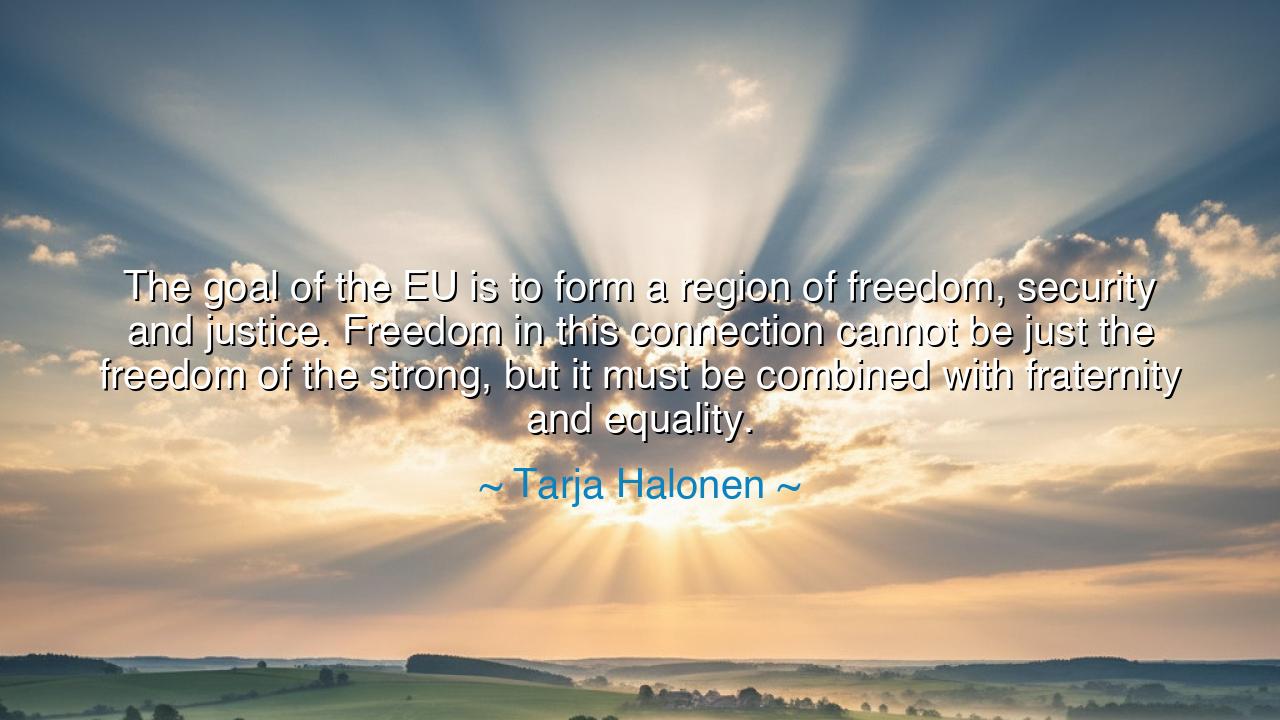
The goal of the EU is to form a region of freedom, security and
The goal of the EU is to form a region of freedom, security and justice. Freedom in this connection cannot be just the freedom of the strong, but it must be combined with fraternity and equality.






When Tarja Halonen declared, “The goal of the EU is to form a region of freedom, security and justice. Freedom in this connection cannot be just the freedom of the strong, but it must be combined with fraternity and equality,” she spoke with the wisdom of one who has seen the rise and fall of nations and the fragile fabric that binds peoples together. Her words remind us that freedom, though noble, can become corrupted if it serves only the powerful. True freedom must walk hand in hand with fraternity and equality, or else it becomes domination by the few rather than dignity for the many.
The meaning of this quote lies in its balance. The European Union, like any great union of peoples, seeks to promise its citizens freedom, security, and justice. Yet Halonen warns that freedom, if left unguarded, becomes the weapon of the strong against the weak. Without fraternity, which binds people together as brothers and sisters, and without equality, which ensures fairness across nations and classes, freedom loses its soul. In her vision, freedom is not a solitary right, but a shared condition, sustained only when all may partake in it equally.
The origin of these words rests in the European project itself, born from the ashes of war. After centuries of conflict that culminated in the devastation of two world wars, European nations sought to create a community where peace could be preserved through shared institutions and values. Leaders knew that peace would not endure unless it rested on the pillars of justice and equality, not merely on the dominance of stronger states. Halonen, as president of Finland, voiced this principle in her commitment to ensuring that the European Union would not drift into a structure of privilege, but remain faithful to its foundation of solidarity.
History offers us parallels that confirm her insight. Consider the Roman Republic, which at its best sought to give its citizens freedom under law, yet faltered when freedom became the privilege of the elite. The voices of the poor were silenced, and fraternity collapsed into factional strife. In the end, Rome’s freedom was consumed by tyranny. This tale warns us, as Halonen does, that freedom must never be the possession of the strong alone. It must be bound with equality, or else it will destroy itself.
Her words also echo the cry of the French Revolution: “Liberty, Equality, Fraternity.” That trinity was not merely a slogan, but a recognition that none of the three can survive without the others. Liberty without equality becomes exploitation; equality without liberty becomes oppression; fraternity without either becomes empty sentiment. Halonen’s declaration places the European Union within this same tradition, urging it to embody freedom that uplifts all, equality that protects all, and fraternity that unites all.
The lesson of her words is this: freedom is fragile if it does not serve the weak as well as the strong. If society allows freedom to mean only the liberty of those with power, wealth, or influence, then it ceases to be freedom and becomes privilege. But if freedom is tempered with justice, if it is guided by fraternity and equality, then it becomes a force that strengthens not only individuals but whole nations.
What then must the listener do? Cherish freedom, but guard it with responsibility. Defend not only your own rights, but also the rights of those who have less power than you. Practice fraternity by seeing strangers as kin, and equality by ensuring no one is cast aside. In your community, your nation, and your world, work not only for your own freedom, but for the shared freedom of all.
Remember always: freedom without equality is hollow, and freedom without fraternity is cold. As Halonen declared, the endurance of any union—whether of Europe or of humanity itself—depends on weaving these three together. Let us pass this wisdom to future generations: that the strongest freedom is not that of the powerful, but that which lifts all into the light of dignity, justice, and peace.






AAdministratorAdministrator
Welcome, honored guests. Please leave a comment, we will respond soon